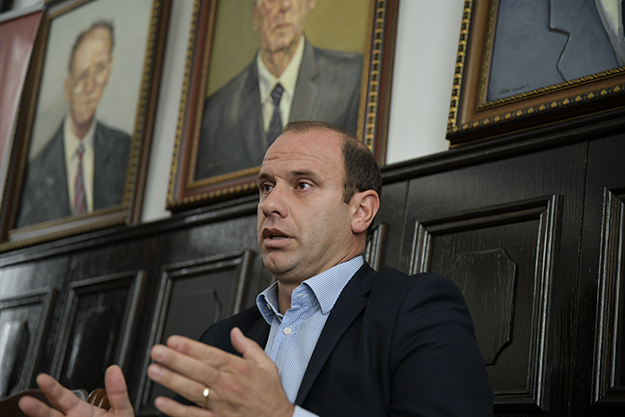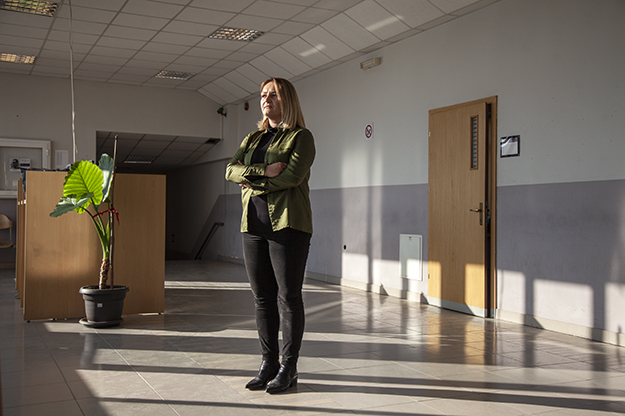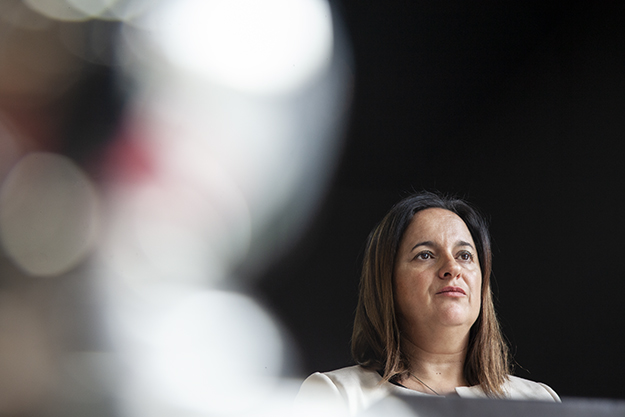In March 2018, then prorector at the University of Prishtina (UP) Teuta Pustina-Krasniqi, made a statement to young women students that would ultimately cost her her job: “I appeal to them to refrain from provoking and dressing provocatively.”
Talking about cases of sexual harassment in the public university for a documentary produced by T7 television, Pustina-Krasniqi called on women to be cautious regarding their appearance, because the clothes that women wear “have a psychological effect and can have a negative influence in environments where students attend lectures.”
Her comments, which appeared to place the blame on victims of sexual harassment rather than perpertrators, was met by an instant backlash. Students and members of civil society organized symbolic protests in front of the Rectorate, demanding her resignation as well as a public apology from the university for the lack of institutional response against cases of sexual harassment.
On March 29, 2018, the Steering Council of the University issued a press release in which it stated that the prorector had been dismissed and that the institution distanced itself from her statements.
However, the students’ demands didn’t end there. Under the slogan “Educational institution with sexist intellectuals,” they pushed forward the idea of creating mechanisms for dealing with sexual harassment within the university.
As a result of the public pressure, the Rectorate took the initiative to create a working group that would create internal regulations for addressing cases of sexual harassment.
Today, a year and a half later, the final draft of the regulations has been produced.
However, the journey of the working group — made up of university professors, members of civil society and the Student Parliament — has been characterized by controversy, with numerous attempts to silence the issue of harassment in the university along the way.
Unacknowledged and unaddressed
UP’s decision to introduce internal policies for this issue was not welcomed by all and faced resistance from the start. In fact, some staff are still reluctant to deal with sexual harassment as an existing phenomenon within the highest educational institution in the country.
“I saw it more as a kind of perception and prejudice, but I do not rule out the possibility that there is harassment,” says Flamur Hyseni, a legal adviser to the rector of UP. “Personally, I’ve only heard gossip.”
Even the person responsible for leading the working group, prorector Myrvete Badivuku-Pantina, is reluctant to admit that there is sexual harassment within the university campus.
“I can’t say if there is or isn’t,” she says. “It’s not good to prejudice.”
The indifferent approach toward harassment within UP, was highlighted during the spring 2018 protests by students that ultimately led to the establishment of the working group.

Prorector Myrvete Badivuku-Pantina led the working group that drafted the University of Prishtina’s first regulations aimed at addressing sexual harassment within the institution. Photo: Majlinda Hoxha / K2.0.
It was especially notable when activist Jeta Berisha spoke publicly about experiencing sexual harassment during her time as a student at the Faculty of Arts. In the protest, she revealed that she had notified faculty staff that she was sexually harassed by an arts professor, and that afterwards the dean himself had advised her not to talk about what had happened to her. She received no response to the complaint that she had submitted to the Rectorate.
Contacted by Kohavision, dean of the Faculty of Arts Agim Selimi said he had “never received a letter from the student in question.” The Rectorate’s communication office failed to respond to K2.0 in relation to the accusations of sexual harassment at the time.
For human rights lawyer Rina Kika, the continuing suggestions from senior university staff that sexual harassment doesn’t exist within UP do not stand.
Kika works as a legal adviser at the Organization for Increasing Quality in Education (ORCA), which was part of the working group. She has also represented the social development NGO Admovere in its attempts to analyze different violations that have been committed within UP and the disciplinary measures that have been undertaken by its Ethics Council.
“Recently, the Ethics Council responded to Admovere’s request for access to public documents, confirming that some of the reports of ethical violations that were made from 2017 to 2019 were related to sexual harassment,” Kika says.

Human rights lawyer Rina Kika explains that there is sufficient evidence to confirm that there are cases of sexual harassment within UP. Photo: Majlinda Hoxha / K2.0.
The denial of sexual harassment is also contrary to the results produced from a survey titled Gender Equality: Challenges and Implementation of Relevant Standards at UP, which was conducted by the Center for Human Rights and Gender Equality within UP. According to the report — obtained through a request for access to public documents — sexual harassment is one of the potential barriers that women students and staff at UP face.
Further evidence of sexual harassment at the university can be found in a 2017 report by arts and community NGO Artpolis, which shows that the surveyed students admitted that they are aware of cases of sexual harassment, but they do not report them because they do not trust the institution.
“There were cases in which students were convinced not to take these issues forward due to potential consequences and/or the public shaming that follows after reporting a case,” the report says.
Clashes over the regulations
In an environment where the very existence of sexual harassment is not fully accepted by leading figures, it is perhaps unsurprising that the process of drawing up internal mechanisms for combatting the phenomenon was far from straightforward.
According to members of the working group, one of the most prominent forms of opposition against introducing regulations for sexual harassment at UP was the argument that they were redundant because the Law against Discrimination already defines harassment as a penal crime, meaning students can directly address cases to the police.
Hyseni, the rector’s legal adviser, says that he was not against regulations per se, but believed that these regulations should only guide people wishing to report sexual harassment so that they are informed about how they can report these cases to law enforcement institutions.
“I am in favor of fighting this deviant social phenomenon, but I want the job to be done properly, not superficially,” Hyseni says. “I don’t believe that UP is more powerful than the state in this regard. I see this as a responsibility of the state, rather than of UP.”

Flamur Hyseni, legal adviser to UP’s rector, says that the regulations must not take over the competencies of justice institutions. Photo: Atdhe Mulla / K2.0.
Kika says that the justification that UP does not have competences to make regulations for protection from sexual harassment does not hold. She says that UP must not deprive itself of the right to define sexual harassment as a serious offense and consequently sanction it in accordance with its own regulations.
“There is no valid legal argument that would support the claim that UP does not have competences to draft regulations for protection from sexual harassment,” she says, adding that it is common practice among universities internationally to have such policies. “[They] have regulations for protection from sexual harassment in the university, as part of which disciplinary measures are undertaken from the university independent of penal procedures.”
Members of the working group say that while a part of the discussion was focused on UP’s competences regarding sexual harassment cases, some members of the academic staff were against the creation of these regulations altogether.
Nita Luci, a professor at the Faculty of Philosophy and a member of the working group, says that no one was interested in talking about student experiences, rather they were keen on protecting professors, many of whom she says have seen these regulations as an attack against their power.
“One of them said: ‘Well if I teach them about the Renaissance period, I will have to show artworks that portray naked bodies, and students could consider this to be harassment — you are denying our academic freedom in the classroom,’” says Luci, giving an example of what she says was part of the banal discussions that went on.

UP professor Nita Luci highlights that there has been huge opposition among UP staff during the process of drafting the regulations. Photo: Majlinda Hoxha / K2.0.
Highlighting that many people around the world have quit school due to sexual harassment, Luci says that she believed that the academic staff were aware of the need for protection and security for students, but that unfortunately the opposite proved true during the process of drafting the regulations.
“There were continuous attempts to prevent it,” she says. “They opened a group on social media and met secretly to create a strategy for opposing the regulations.”
Ariana Qosaj, an activist who works for Kosovo Women’s Network as well as a member of the working group, says that when the draft was submitted for comments, there was a mobilization “especially among male professors of the Faculty of Law who were part of the resistance and wanted to preserve the status quo.”
She adds that there had been a similar civil society initiative to create such regulations in 2005-06, but the management of UP never took it seriously, implementing a strategy of secret resistance so that they did not take any steps to regulate the issue at that time.

KWN activist Ariana Qosaj says attempts were made to block the process of drafting the regulations, mainly by male professors within the Faculty of Law. Photo: Majlinda Hoxha / K2.0.
Meanwhile, Hyseni does not see this opposition to adequately addressing sexual harassment complaints at the university from predominantly male professors as something based on gender. He says that the working group was dominated by women and believes that women professors had insisted so strongly on their beliefs due to their own insecurities.
“There was quite a lot of competition between ideas [within the working group],” he says. “I did not notice this gender-based differentiation at all, but what I didn’t find to be positive was their insistence by any means. For me, this showed insecurity, even though 98% of the members were women and 2% were men.”
Debating the details
Despite the barriers throughout the working group process, a final draft of the regulations on sexual harassment has now been agreed. The resistance to them, however, continues.
According to the final draft of the regulations, when incidents of sexual harassment are reported in the university, the burden of proof falls on the suspect, in line with the Law on Protection from Discrimination. One of the main points of contention was the suggestion that this could open the way for baseless and false reports of harassment.
According to Hyseni, securing evidence for sexual harassment is a huge challenge, and it is difficult to get people to testify for these kinds of cases.
“Where is the logic? You denounce someone for sexual harassment and they’re told that they have to bring the evidence for exculpation,” he says. “This is communist logic. In the contemporary democratic system, this is not practiced.”


